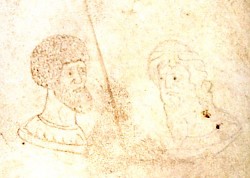Ptolemy of Alexandria
Ptolemy of Alexandria (c.85-c.165): famous astronomer, author of the great synthesis of ancient celestial knowledge.

Like Aristarchus, Eratosthenes, and Hipparchus, Ptolemy of Alexandria was interested in both geography and astronomy. On both subjects, he published important works. His astronomical book was called the Megalê Syntaxis, the 'big explanation'. It is a summary of all astronomical knowledge of his age, and it remained the most important work on this subject until the sixteenth century, especially because he gave mathematical explanations of the phenomena. To get a grip on the chronology of the preceding nine centuries, he used a chronological system that is called the Canon. After Antiquity, the Arabs translated the Megalê Syntaxis and called it Almagest, under which name it is still known.
In his Tetrabiblos, Ptolemy explained the importance of astrology, and told how the stars influenced countries and individuals. In the eight books of his Geography, he deals with map making and describes the entire known earth. It remained one of the most important works until 1488, when Bartolomeus Diaz reached the Cape of Good Hope and proved that Ptolemy's statement that one could not circumnavigate Africa was simply wrong.